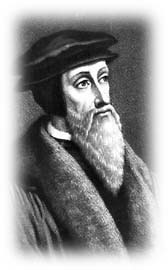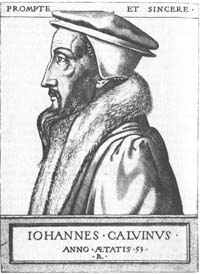|
John Calvin
 Younger than Martin Luther by twenty-five years, John Calvin grew up during the time that Protestantism was being established. Younger than Martin Luther by twenty-five years, John Calvin grew up during the time that Protestantism was being established.
Educated at the University of Paris, Calvin was educated as a laywer but, like Zwingli, he was saturated with the ideas of Northern Renaissance humanism.
Converted to Christianity in his early twenties, Calvin began to devote more and more of his energies to theological matters. His efforts greatly changed the face of the emerging Protestant church, for he was unafraid to address questions that earlier reformers didn't want to answer.
Calvin was invited to Geneva to help build the new Reformed church. His most important efforts involved the organization of the church and city, modeling the social organization entirely on Biblical principles.
He created a leadership structure, and a catechism designed to impose doctrine on all members of the church. He proposed a strict moral code on the citizens of Geneva, derived from a literal interpretation of Scripture.
The people of Geneva came to believe that they had replaced one church with another that was its identical twin. In particular, they saw Calvin's reforms as imposing a new form  of papacy, but with different names and different people. of papacy, but with different names and different people.
They threw him out, exiling him from Geneva in 1538, and Calvin moved to Strasbourg where he busied himself writing commentaries of the Bible, and completing his massive account of Protestant doctrine.
In 1540, a new group of politicians invited him back to Geneva. He went right to work revolutionizing Genevan society, restructuring codes so as to incorporate the church within the city government, particularly in disciplining the populace.
By the mid-1550s, Geneva was thoroughly Calvinistic in thought and structure, and was the most important Protestant center of Europe in the 16th century. Facing persecution in their own countries, Protestants from France, England, Scotland, and the Netherlands came to Geneva for sanctuary. Many, if not most of these reformers adopted the more radical Calvinist doctrines. It is likely for this reason that Calvinism became the dominant branch of Protestantism from the 17th century onward.
|
